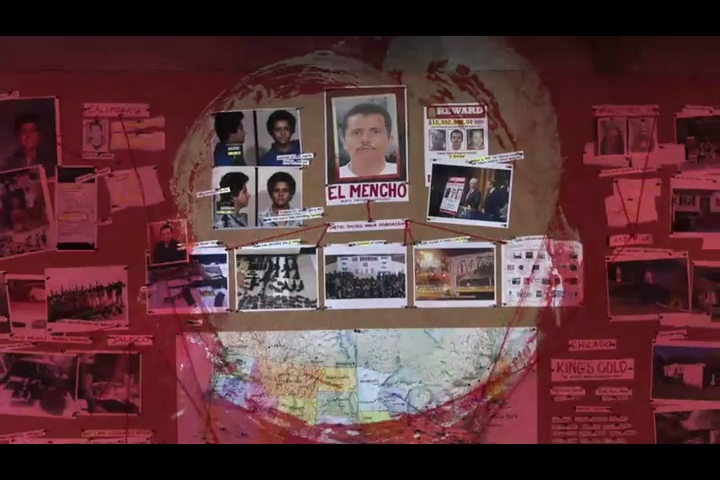
El Mencho documentary: How CJNG Mexican cartel boss is infiltrating US
This short film details The Courier Journal’s investigation into CJNG and its leader, El Mencho, began in early 2019 and what was uncovered.
Alton Strupp and Matt Stone, Louisville Courier Journal
- In 2019, Morales recounted the deadly helicopter crash as part of a special report by the Courier Journal.
- Morales appeared at events through the years and symbolized the bravery in the daunting fight against powerful cartels.
A former Mexican police officer, who survived a fiery helicopter crash and emerged as a symbol in the fight against powerful drug cartels, died in an ambush April 30.
An SUV bumped a black truck driven by Iván Morales Corrales, 43, and gunmen hopped out and fired more than a dozen shots, killing Morales and an unidentified woman in the state of Morelos, a 2.5-hour drive south of Mexico City, according to two retired U.S. drug agents and multiple Mexican media outlets.
It’s unclear who killed the victims in the city of Temixco or why and the case remains under investigation. The killings occurred during the 10th anniversary week of the downing of the helicopter, blamed on top U.S. target, Cártel Jalisco Nueva Generación, known as CJNG.
Morales is survived by a 9-year-old boy and a 4-year-old girl.
In 2019, Morales recounted the deadly helicopter crash that left him severely burned and disfigured during an interview with a freelance reporter for the Courier Journal for a special report on CJNG, part of a five-year investigation into the source of the drugs fueling the deadliest drug epidemic in American history. The powerful super cartel with more than 5,000 members is blamed, along with the infamous Sinaloa Cartel, for the bulk of fentanyl, cocaine and heroin that saturates the streets of Kentucky, Tennessee and other U.S. states.
The morning of the crash, Morales climbed into one of five military helicopters and headed out in the darkness to raid a CJNG compound in a rural area of the western state of Jalisco − known for its oceanside resort town of Puerto Vallarta. He and other federal police officers teamed with soldiers on a secret mission to arrest CJNG’s elusive cartel boss, Rubén “Nemesio” Osegura-Cervantes, known as “El Mencho,”
As the helicopters few above a convoy of CJNG trucks and SUVs, cartel members fired grenade launchers and armor-piercing guns − including one obtained from a U.S. resident in Oregon − and sent a military helicopter careening into trees. Morales crawled through flames to escape, suffering significant burns, but a fellow officer and several soldiers died.
Earlier that day, his then-fiancé told him she was pregnant with their first child.
The day of the helicopter crash, Morales knew he might die but repeatedly told the soldiers who hoisted him on a stretcher why he needed to survive: “I’m going to be a dad!”
Morales’ colleague, the only other Mexican police officer on the mission, didn’t make it. Neither did eight soldiers with SEDENA, which is Mexico’s national defense.
Morales suffered second-degree and third-degree burns over 70% of his body and nearly died of organ failure in a Mexico City hospital. His pregnant fiancé kept a vigil beside him.
“Knowing I was going to be a dad motivated me a lot to fight,” Morales said during the 2019 interview.
In the hospital, he married his love of two years, whom he didn’t want to name publicly at the time for her protection.
After several surgeries and a month in recovery, Morales left the hospital Oct. 9, 2015, wearing his navy-blue uniform.
Six weeks later, his son was born.
Morales loved being a police officer but was disfigured and unable to return to work. He was able to walk down the aisle of a Catholic church for a small wedding.
Interviewed four years after the crash, Morales said it was difficult to cope with his disfigurement. Strangers often stare and whisper.
Some days, his then 3-year-old son would sit in his lap and trace burn scars with his little fingers and ask what happened. Morales would say he was hurt in an accident because he felt his son was too young to understand the ruthlessness of cartels. He said he dreaded the thought of one day having to tell him the truth.
The brazen show of violence in downing a military helicopter stunned law enforcement on both sides of the border and put them on notice how far CJNG’s leader was willing to go to stop them.
The DEA put CJNG cartel boss on its Most Wanted fugitive list. The U.S. State Department is offering up to $15 million reward for information leading to the capture of El Mencho, now considered the world’s most powerful cartel boss.
Through a joint U.S.-Mexico investigation, agents traced one of the guns CJNG used to shoot down the military helicopter to Erik Flores Elortegui − a Mexican native and U.S. citizen who lived in Portland, a spokesperson for the ATF’s Seattle Field Division, confirmed in 2022. Flores Elortegui remains a fugitive on the ATF’s Most Wanted list.
Morales appeared at several events through the years and symbolized bravery in the daunting fight against powerful cartels. Then-Mexico President Enrique Peña Nieto honored Morales at a public ceremony.
Despite all that Morales lost, he said he had no regrets.
“I knew the risks,” he said. “I was committed to doing my job.”
Morales expressed optimism that El Mencho’s reign would one day end.
“It is not hopeless.”
Beth Warren covers health care for The Tennessean and can be reached at bwarren@tennessean.com.

